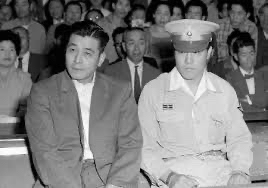Man, 84, on death row over fatal wine poisonings hopeful of retrial
(Mainichi Japan) April 6, 2010

Masaru Okunishi
A death row inmate convicted of killing five women with poison-laced wine is hopeful of a retrial after the Supreme Court on Monday dismissed a lower court decision against a retrial.
The move has paved the way for a retrial for Masaru Okunishi, 84, whose death sentence has been confirmed over a murder case in which five women died after drinking wine laced with an agricultural chemical in Nabari, Mie Prefecture, in 1961.
The top court's Third Petty Bench sent the case back to the Nagoya High Court on Monday after annulling the high court's 2006 ruling that had overturned a decision for a retrial. The high court will once again examine whether to open a retrial.
"It has not been determined yet whether the agricultural chemical used in the incident was among Okunishi's belongings," said the top court, ordering the Nagoya High Court to conduct a fresh examination.
Monday's decision was reached unanimously by the five judges at the Third Petty Bench.
"Considering that nearly 50 years have passed since the incident and it's been eight years since the defendant filed his seventh appeal for a retrial, examination of evidence at the high court should be kept to a minimum and conducted in an efficient manner," said judge Mutsuo Tahara.
At issue is whether the investigators' test results, in which a component of the agricultural chemical that Okunishi confessed to have laced in the lethal wine was not detected in the wine, could be held valid.
The Nagoya High Court had determined that there could be a possibility of an element not being detected if it was hydrolyzed, before sentencing Okunishi to death in 1969. However, his defense counsel conducted a fresh examination employing a different method and maintained that the element should have been detected if it was really laced in the wine.
The Nagoya High Court accepted the attorneys' assertion and decided to open a retrial in 2005, but the court later annulled the decision following prosecutors' opposition and said, "An element could be undetected depending on the circumstances where the wine was left."
The Supreme Court on Monday said a fresh examination should be conducted using the same agricultural chemical and employing the same method as investigators initially used.
"The high court cannot be said to have examined the investigators' test results based on scientific knowledge, nor looked into whether the agricultural chemical laced in the wine was different to the one (that the defendant confessed to have used), or whether the element was not detected simply because its concentration was low and thus its reaction was weak," the court said.
In the highly publicized Nabari wine poisoning case, 17 women collapsed after drinking white wine laced with an agricultural chemical during a gathering at a public hall in Nabari on the night of March 28, 1961. Five of them died while 12 others were injured. Okunishi was arrested and indicted after reportedly confessing that he tried to solve the problem of a love triangle with his wife and his lover.
The Tsu District Court acquitted Okunishi after determining that his confessions were not credible, but the Nagoya District Court overturned the ruling and sentenced him to death, which was confirmed by the top court in 1972. All six appeals for a retrial that Okunishi had previously filed were turned down.


